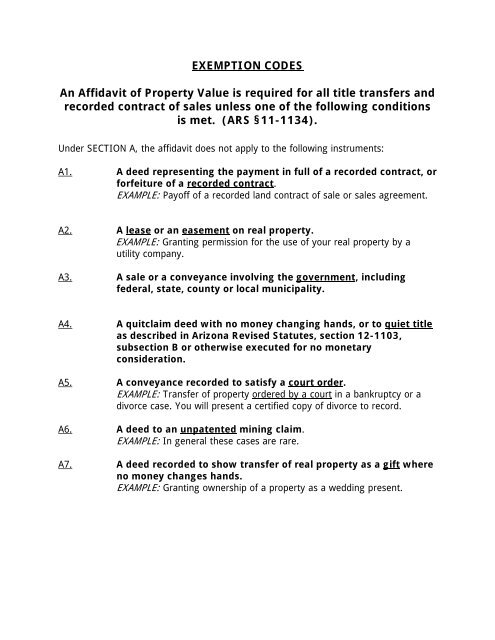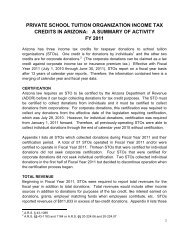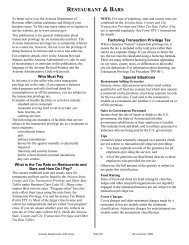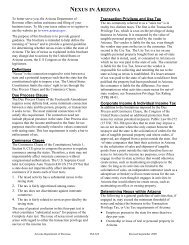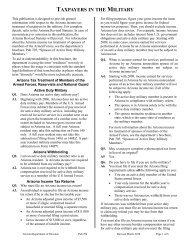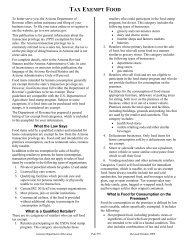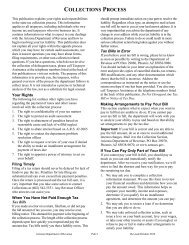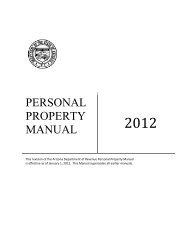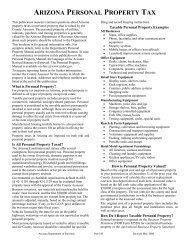Create successful ePaper yourself
Turn your PDF publications into a flip-book with our unique Google optimized e-Paper software.
EXEMPTION CODES<br />
An Affidavit of Property Value is required for all title transfers and<br />
recorded contract of sales unless one of the following conditions<br />
is met. (ARS §11-1134).<br />
Under SECTION A, the affidavit does not apply to the following instruments:<br />
A1. A deed representing the payment in full of a recorded contract, or<br />
forfeiture of a recorded contract.<br />
EXAMPLE: Payoff of a recorded land contract of sale or sales agreement.<br />
A2. A lease or an easement on real property.<br />
EXAMPLE: Granting permission for the use of your real property by a<br />
utility company.<br />
A3. A sale or a conveyance involving the government,<br />
including<br />
federal, state, county or local municipality.<br />
A4. A quitclaim deed with no money changing hands, or to quiet title<br />
as described in Arizona Revised Statutes, section 12-1103,<br />
subsection B or otherwise executed for no monetary<br />
consideration.<br />
A5. A conveyance recorded to satisfy a court order.<br />
EXAMPLE: Transfer of property ordered by a court in a bankruptcy or a<br />
divorce case. You will present a certified copy of divorce to record.<br />
A6. A deed to an unpatented mining claim.<br />
EXAMPLE: In general these cases are rare.<br />
A7. A deed recorded to show transfer of real property as a gift where<br />
no money changes hands.<br />
EXAMPLE: Granting ownership of a property as a wedding present.
EXEMPTION CODES<br />
Under SECTION B, the Affidavit does not apply to the following transfers of title:<br />
B1. A transfer solely in order to provide or release security for a debt<br />
or obligation, including a trustee’s deed pursuant to power of<br />
sale under a deed of trust.<br />
EXAMPLE: Party #1 transfers title to party #2 to provide security for a<br />
loan from party #2.<br />
EXAMPLE: Party A transfers title to Party B to gain release from a debt<br />
owed to Party B.<br />
B2. A transfer that confirms or corrects a deed previously<br />
EXAMPLE: name on the original deed was misspelled.<br />
recorded.<br />
B3. A transfer of residential property between relatives,<br />
with no<br />
money or nominal consideration changing hands.<br />
Relationship limited to husband and wife or ancestors of either, parent<br />
and child or descendants of children, grandparents and grandchildren and<br />
natural or adopted siblings.<br />
.<br />
B4. A transfer of title on a sale for delinquent taxes or assessments.<br />
EXAMPLE: Property sold in a Sheriff’s sale.<br />
NOTE: This type of sale usually involves a Treasurer’s Deed.<br />
B5. A transfer of title on partition.<br />
Partition, in this case, means a<br />
division of a property between co-owners or co-proprietors.<br />
EXAMPLE: Dividing a large parcel into smaller parcels to be distributed<br />
among the heirs of an estate so that each owns their parcel. You are<br />
doing a lot split and there are no new owners involved.<br />
NOTE: If an owner divides a parcel in such a manner that the new parcels<br />
remain in his ownership, in essence there is no transfer of title, and thus<br />
no need for an Affidavit nor an Exemption Code. Yet if the Recorder<br />
desires the B5 Exemption Code can be utilized in this situation. For<br />
instance, an owner of a 10-Acre parcel divides it into a 1-Acre parcel and<br />
a 9-Acre parcel, and he retains ownership of the two new parcels.<br />
B6. A transfer of title pursuant to a merger of corporations.<br />
EXAMPLE: Title of property owned by Corporations X and Y changing to<br />
Corporation Z, when Corporations X and Y merge to form Corporation Z.
B7.<br />
B8.<br />
EXEMPTION CODES, cont.<br />
A transfer between related legal entities for no consideration,<br />
nominal consideration. Allowable relationships are:<br />
• Subsidiary and parent company.<br />
• Commonly controlled entities.<br />
• Between an LLC and a member of the LLC.<br />
• From a partner to its partnership<br />
• From a partnership to a partner<br />
• From a joint venturer to its joint venture<br />
• From a joint venture to a joint venturer<br />
• From a trustee to its trust beneficiary<br />
• From any of the above entities to a single purpose entity in<br />
order to obtain financing<br />
A transfer from a person to a trustee, or from a trustee to a trust<br />
beneficiary, with only nominal consideration.<br />
EXAMPLE: Transfer of property under the terms of a will. You are<br />
transferring your property into a trust.<br />
B9. A transfer of title to and from an intermediary for the sole<br />
purpose of creating a Joint Tenancy Estate, or some other form of<br />
ownership.<br />
EXAMPLE: Transfer to and from a straw man. A straw man is a<br />
disinterested third party, usually used to change the form of ownership,<br />
for example, creating a Joint Tenancy Estate.<br />
B10. A transfer of title from a husband and wife, or from one of them,<br />
to both husband and wife to create an Estate in Community<br />
Property with right of survivorship.<br />
Example: You and/or your spouse already own the property and you are<br />
recording a Community Property With Rights of Survivorship Deed.<br />
B11. A transfer of title from two or more persons to themselves, to<br />
create an Estate in Joint Tenancy with rights of survivorship.<br />
EXAMPLE: Two individuals convey ownership to themselves in a Joint<br />
Tenancy Estate with the right of survivorship. You already own the<br />
property, and you are recording a Joint Tenancy With Rights of<br />
Survivorship Deed.<br />
B12. A transfer of title pursuant to a Beneficiary Deed with only<br />
nominal consideration for the transfer.<br />
Example: You are recording a Beneficiary Deed.
B13.<br />
B14.<br />
EXEMPTION CODES, cont.<br />
From an owner to itself or a related entity for no or nominal<br />
consideration to consolidate or split parcels.<br />
Due to a name change.


